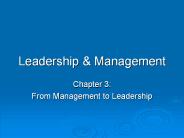Leadership - PowerPoint PPT Presentation
1 / 20
Title:
Leadership
Description:
Authority is control or power to act on one's responsibilities ... Variety and magnitude of responsibilities ... Time management. Job enrichment. Development of ... – PowerPoint PPT presentation
Number of Views:19
Avg rating:3.0/5.0
Title: Leadership
1
Leadership Management
- Reading for Lesson 7
- The Chain of Command and Leadership Triad
2
Lesson 7Reading Objectives
- The student will comprehend the concept of the
Chain of Command as an institution. - The student will know the key factors that
determine the effectiveness of the Chain of
Command. - The student will know the terms Authority,
Responsibility, and Accountability and describe
how they interrelate within the Leadership Triad.
3
Lesson 7Reading Objectives
- The student will comprehend how Authority,
Responsibility, and Accountability relate within
the Chain of Command. - The student will know why we are held accountable
for results and not intentions. - The student will know how Authority is an
important tool for success in the execution of
ones Responsibilities.
4
The Chain of Command as an Institution
- Both a structure and a process
- It defines levels of decision-making, lines of
Authority, areas of Responsibility, levels of
Accountability, and the flow of information - Not a written document, but rather a conceptual
framework that governs how we function in the
Naval Services
5
The Chain of Command as an Institution
- Its effectiveness requires pledge of faith to
uphold it as an institution much like the oath to
support and defend the Constitution - As an institution, it is not made up of
individuals - It is a structure of Areas of Responsibility,
levels of Accountability, and lines of Authority - Loyalty to the Chain of Command means supporting
this institution, regardless of the individuals
involved
6
Effectiveness of the Chain of Command
- Key Factors that determine effectiveness
- Trust
- Confidence
- Trust and confidence are earned through
demonstrated abilities and loyalty - Proper use of Chain of Command ensures everyone
is informed and provides important (human)
resources to aid in successful completion of the
responsibility
7
Leadership Triad
- Composed of Authority, Responsibility,
Accountability - Fulfilling responsibilities through proper use of
authority and acceptance of accountability is how
special trust and confidence are earned
8
Authority
- Legitimate right to use assigned resources,
including personnel, to accomplish a task or
objective the right to give orders and expect
obedience
9
Sources of Authority
- Sources of authority include
- Conferred by the group over which authority is
exercised (may be legitimate or illegitimate) - Based on position, e.g., command duty officer,
gate sentry - Based on rank/pay grade
10
Responsibility
- The obligation to complete a task or perform a
mission. - Responsibility exists individually and at all
levels of an organization - Others may be assigned tasks oriented to the
obligation, but overall Responsibility remains
with person assigning the tasks
11
Accountability
- Process by which a subordinate reports the
outcome of an assigned task or mission and
accepts the consequences, good or bad - Ultimate accountability can never be delegated,
even though authority and responsibility may be
12
Leadership Triad Interrelationship
- Responsibility is assigned, assumed or conferred
- Once held, Responsibility cannot be transferred
- Accountability is extant to Responsibility.
- Accountability is being answerable to how the
Responsibility is handled - Authority can be delegated. It is the critical
component of the triad - Authority is the power or control to act on the
Responsibility
13
Leadership Triad and the Chain of Command
- Responsibilities are defined by the structure of
the Chain of Command - Chain of Command identifies those entrusted with
decision-making - Lines of Authority are established by the Chain
of Command - This facilitates delegation of Authority
- Assignment of Responsibility engenders
Accountability
14
Accountability for Results
- Accountability emphasizes results, not intentions
- Serves as basis for accounting for ones actions
or failure to act - Does not imply that the bottom-line is more
important than the process - Emphasizes necessity to consider all possible
consequences in the execution of duties
associated with Responsibilities
15
Authority to Execute
- Authority is control or power to act on ones
responsibilities - By delegating Authority, chances of success are
increased - Failure to meet assignments may indicate failure
to delegate Authority - Increasing subordinates Authority will likely
improve subordinates performance
16
Delegation
- Major aspects
- Variety and magnitude of responsibilities
- Amount of discretion or range of choice allowed
in carrying out responsibilities - Authority to take action and implement decisions
without prior approval - Frequency and nature of reporting requirements
- Flow of performance information
17
Delegation
- Potential advantages
- Improvement of decision quality
- Great subordinate commitment
- Time management
- Job enrichment
- Development of managerial talent
18
Reasons Leaders Fail to Delegate
- Strong need for power
- Doubt in subordinate ability
- Perception of different values and objectives in
a subordinate - Manager has exceptional task expertise,
self-confidence, and desire to maintain quality
of work - Situational constraints
- Protection of confidential information
- Highly interdependent subordinate jobs
19
What to Delegate
- Tasks that can be done better by subordinate
- Tasks that are urgent but not high priority
- Tasks relevant to a subordinates career
- Tasks of appropriate difficulty
- Both pleasant and unpleasant tasks
- Tasks not central to the managers role
20
How to Delegate
- Specify responsibilities clearly
- Provide adequate authority, specify limits of
discretion - Specify reporting requirements
- Ensure subordinate acceptance of responsibilities
- Inform others who need to know
- Monitor progress in appropriate ways
- Ensure subordinate receives necessary information
- Provide support/assistance--avoid reverse
delegation - Make mistakes a learning experience































